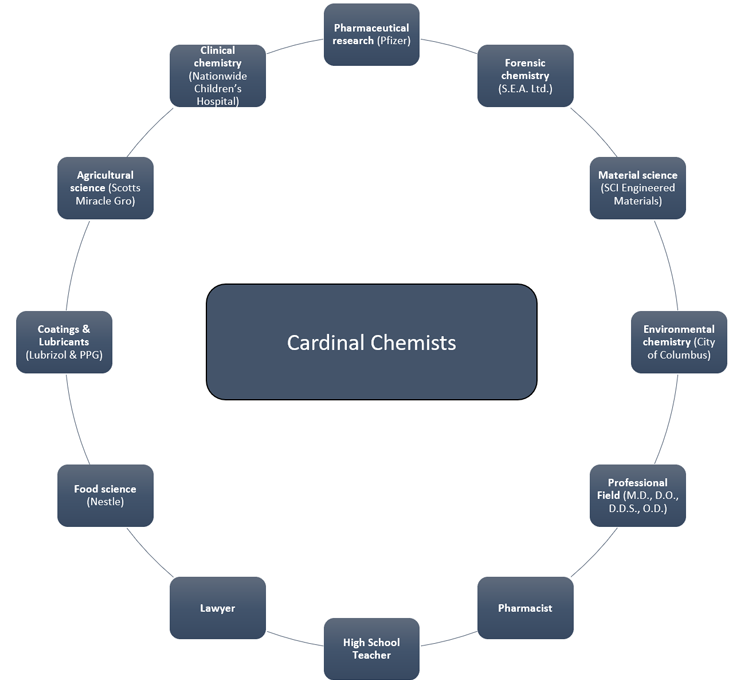WE ARE growing the next generation of chemists and other career professionals.

Chemistry is often called the central science and our alumni span a variety of disciplines – pharmacists, secondary school teachers, forensic chemists, physician assistants and so much more. They hold positions such as President & CEO, Senior Technical Fellow, and Project Manager among others.
Chemistry supports over 25% of the U.S. GDP (American Chemistry Council) meaning that people with chemistry degrees are highly employable. This is especially true in Ohio, which ranks 3rd in the nation in chemical manufacturing positions (Ohio Chemistry Technology Council).
For students considering a professional pathway, only 10% of applicants to medical school majored in physical sciences, which includes chemistry (American Medical Association). This means that you will stand out because you have a different background; especially coupled with leadership, research or internships and cross-cultural experiences at Otterbein, this is a winning combination.
Below are some ideas to get you thinking about some of the career possibilities for chemists:
Industrial Chemists
The majority of chemists, about 60%, are employed in the chemical industry. Industrial chemists develop and oversee the chemical processes that turn raw materials into valued goods. They are responsible for developing such life-enhancing products as plastic, synthetic fibers, pharmaceuticals, food products and flavorings, agricultural chemicals, cosmetics, fragrances, detergents, and adhesives.
Chemists must understand not only the chemical design of a product, but how to scale the production up for mass production. Chemical engineers are also involved in quality control, analyzing the product at various stages during production to make sure that it meets requirements.
Many students at Otterbein choose to complete an internship while they are a student, allowing them to develop important skills and learn about career options in chemical industry.
Government Laboratories
Federal and local governments employ many chemists to do such things as monitor and protect the environment, fulfill regulatory responsibilities such as testing the safety and effectiveness of new drugs, and provide basic research support for industry.
Major federal agencies which employ a large number of chemists are the Food and Drug Administration (FDA), the Environmental Protection Agency (EPA), the Department of Energy (DOE), and The National Science Foundation (NSF).
Stephane Gnewuch ’15 completed a Summer Undergraduate Research Fellowship (SURF) at the National Institute of Standards and Technology (NIST) while she was a student at Otterbein. This experience helped inform and guide her choice to pursue a Ph.D. (U. of Maryland) in the area of materials and neutron scattering.
Education
University professors generally both teach classes and conduct research with graduate students. They may contribute to the basic study of chemistry or work on more applied problems. Professors publish the results of their work in scientific journals and frequently interact with chemists in industry. A Ph.D. degree is almost essential for work in this area.
A career as a chemistry teacher in a high school or community college is another career possibility. The teacher has the satisfaction helping teenagers and young adults become interested in this diverse field.
Clinical Laboratories
Clinical chemists and technicians analyze samples to provide medical doctors with diagnostic information. They may also develop new diagnostic tests and methods, as well as carry out basic chemistry research.
More Career Options
Chemistry provides a solid background for many other occupations. For instance, many medical doctors, forensic chemists, patent attorneys, metallurgists, and technical writers major in chemistry.
Many chemists also combine an interest in business with their technical knowledge and work their way into sales or management positions.
Medical school and the MCAT
The Chemistry major can be the basis of an excellent preparation for medical school and for the MCAT. All medical schools require at least two years of chemistry for admission.